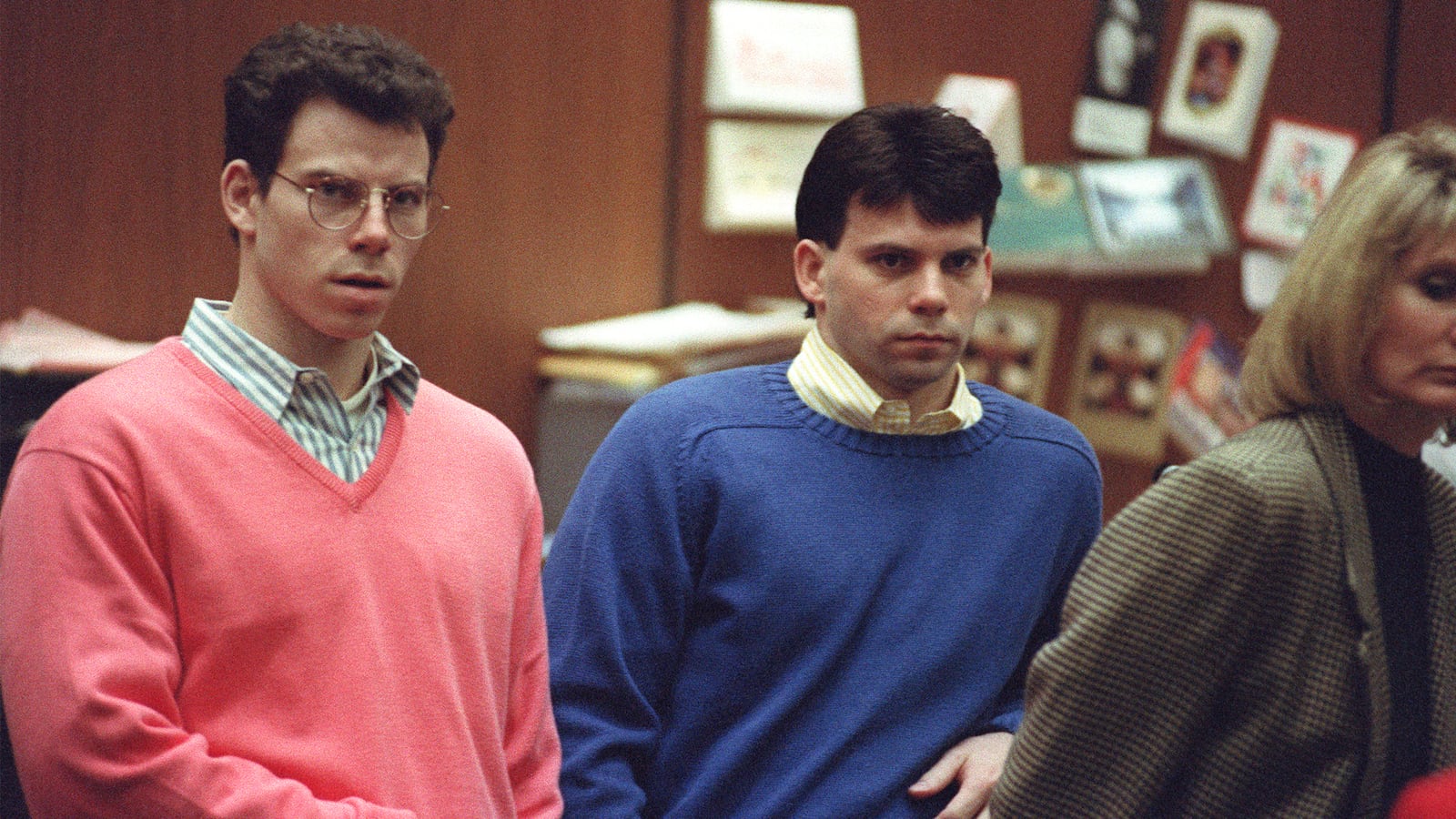Having allowed Ryan Murphy to make his case against Lyle and Erik Menendez with his eight-part dramatic series Monsters: The Lyle and Erik Menendez Story, Netflix now lets the infamous brothers tell their own tale in The Menendez Brothers, a feature-length documentary, premiering Oct. 7, that paints them in a wholly sympathetic light.
Those who’ve rallied behind the siblings and their claims that they murdered their parents because of lifelong sexual abuse and an imminent fear for their lives will eagerly take to director Alejandro Hartmann’s non-fiction film, whose main draw is new telephone interviews with the imprisoned convicts. Anyone less convinced of their “abuse excuse,” however, are likely to find it a distasteful attempt to paint the men not as victimizers but as victims of their parents, the media, and an unjust legal system.
On Aug. 20, 1989, Lyle and Erik Menendez used shotguns to literally obliterate their parents as they sat watching TV in the family’s lavish Beverly Hills home. The explanation they ultimately gave for this crime was a history of heinous rape and abuse at the hands of their father José, an entertainment industry powerhouse whom they both adored and feared, as did their mother Kitty, who they allege knew about and ignored their mistreatment.
Moreover, they were convinced that, on the night of the murders, they were on the verge of being assassinated by their father and mother. “I believed it was an honest and reasonable belief that I was going to die,” says Erik in The Menendez Brothers. “I believe that any person, if they lived my life, I don’t see how they couldn't have believed that they were about to die.”

Erik Menendez with his attorney Leslie Abramson, and his brother Lyle Menendez
Ted Soqui/Sygma via Getty ImagesThis has been Erik and Lyle’s line for the past three-plus decades, and The Menendez Brothers adds nothing to it. Rather, it merely grants them a platform to repeat their account of cruelty, intimidation, and trauma in great detail, all of it bolstered by copious clips from their first televised trial (in particular, their own weepy testimony) and interviews with experts who spoke on their behalf, jurors who bought (and apparently still buy) their version of events, and author Robert Rand, who’s long accepted that José was a monster. The sole person involved who actually thinks Lyle and Erik received the punishment they deserved (i.e., life in prison without parole) is Los Angeles prosecutor Pamela Bozanich, who states, “That whole defense was fabricated, and it was done artfully, but it was fabricated.”
Bozanich is included in The Menendez Brothers as a token gesture of objectivity, but Hartmann’s film is fully on the side of its subjects and the numerous TikTok users who, as of late, have sought to rewrite this narrative. Erik sees that movement as the byproduct of a generational divide between then and now, saying, “It was a culture of silence. And that culture of silence existed up until the ’90s. And then I think it finally got broken in the 2000s.”
Bozanich, on the other hand, has little patience for the social media fans who’ve flocked to the brothers, proclaiming, “Your beliefs are not facts. They’re just beliefs. And by the way, all you TikTok people—I’m armed. We got guns all over the house, so don't mess with me."
The Menendez Brothers dutifully recaps this tabloid saga and yet those who’ve recently binged Murphy’s series will immediately recognize the many damning facts about Lyle and Erik that—because they might complicate a pro-Menendez stance—are not cited here. Those include Lyle returning to his car to reload his shotgun in order to finish off Kitty; Menendez lawyer Lisa Abramson’s use of the same abuse defense in a prior trial; Lyle and Erik never mentioning abuse to anyone before their incarceration (including the therapist, Dr. Jerome Oziel, to whom they confessed the killings); and the fact that José had cut his sons out of his will—the last of which contradicts Erik’s assertion that they couldn’t have murdered for money because they were destined to inherit it.
Couple all that with the film downplaying the boys’ post-murder behavior (including their spending spree, which is fleetingly addressed) and the lengths to which they went to acquire firearms and establish an alibi, and The Menendez Brothers comes across as transparently one-sided. Not only does it paint Lyle and Erik’s double homicide as no more than manslaughter (since they genuinely thought José and Kitty were about to slay them), but it has them talk extensively about their father’s tyrannical nature, their desperate desire to please him, and their deep sorrow over the choices they made. A couple of family members additionally chime in, although Hartmann manages to get few revealing comments from anyone, Lyle and Erik included.
With regards to Kitty, Erik laments, “I miss my mother tremendously. I wish that I could go back and talk to her and give her a hug and tell her I love her and I wanted her to love me and be happy with me and be happy that I was her son and feel that joy and that connection. And I just want that.” As for José, he admits, “It's more difficult with my father. To me as a boy, he was more than just a man. He was like the modern version of an ancient Greek god. He was different than any man I had ever met. And I simply idolized him. I wanted to be like him. But he was rarely a dad.”

The Menendez Brothers
NetflixLyle, meanwhile, says that “I did feel very responsible for [Erik] enduring years of horror,” and he’s heartened by his TikTok supporters, who “really have tremendous hope. Young people have taken the time to figure out what happened. And they understand it in ways that older people don’t.”
The Menendez Brothers is filled with such material, and it culminates with the suggestion that the reason they were eventually found guilty in their second trial was that the jury didn’t receive exculpatory evidence about their abuse because the Los Angeles legal system, desperate for a win after the failure of its O.J. Simpson prosecution, rigged the proceedings. Menendez backers will no doubt eat this slanted stuff up. Nonetheless, it’s quite a shortcoming when a documentary avoids so many elements of its own story that it proves less comprehensive and compelling than a Ryan Murphy drama.









